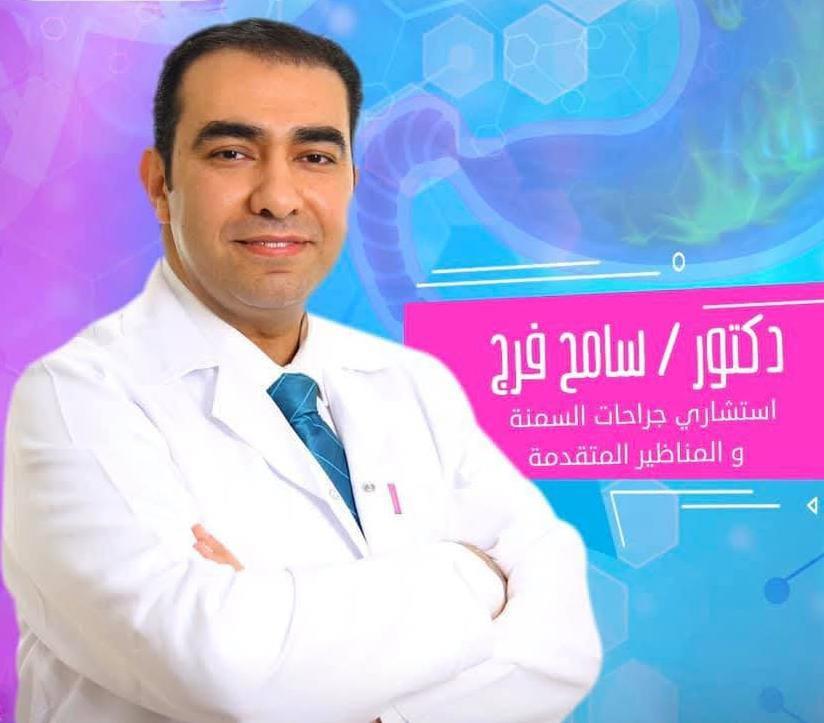Dr. Samah Farag - Consultant in Laparoscopic Surgery, Gastrointestinal Surgery, and Colon Cancer
Dr. Samah Farag is a highly distinguished consultant with extensive experience in general surgery, laparoscopic surgery, and oncological surgery. He is considered one of the leading experts in obesity surgery, cancer surgery, and gastrointestinal surgery in both Egypt and the United Kingdom. Dr. Farag specializes in providing advanced surgical solutions using laparoscopic techniques, which helps patients recover quickly while minimizing risks.
Academic Qualifications:
Fellowship of the Royal College of Surgeons, St. George's University - London (2008): Dr. Farag completed his training in general surgery and laparoscopy at one of the UK's most prestigious medical colleges.
Fellowship in Obesity Surgery - Homerton Hospital, London: Specializing in obesity surgery and weight-loss techniques using laparoscopy.
Fellowship in Cancer Surgery and Colorectal Surgery - Worthing Hospital, England: Focused on advanced cancer surgery and colorectal surgery.
Professional Experience:
Consultant in Gastrointestinal Surgery and Colon Cancer Surgery at the Brighton University Hospitals, England (since 2016): Dr. Farag leads the gastrointestinal surgery department and treats complex cancer cases using the latest techniques in laparoscopic surgery.
Senior Consultant in General Surgery and Advanced Cancer Surgery in several major hospitals in the United Kingdom.
Subspecialties and Medical Services:
Dr. Samah Farag offers a wide range of advanced surgical specialties, including:
Obesity and Weight Loss Surgery: Utilizing innovative laparoscopic techniques to treat severe obesity and achieve guaranteed weight loss results through advanced surgeries such as gastric sleeve surgery.
Abdominal Surgery: Treating abdominal issues such as hernias, bowel inflammation, or bowel tumors.
Cancer Surgery (Colon, Breast, Stomach): Treating colon cancer with laparoscopy and advanced surgical techniques to minimize recovery time.
Gastrointestinal Surgery and Laparoscopy for Adults: Treating gastrointestinal issues such as ulcers, stomach inflammation, and acid reflux using laparoscopic procedures.
Endocrine Surgery: Treating glandular problems such as thyroid or adrenal gland issues.
Trauma and Injury Surgery: Repairing injuries resulting from accidents and abdominal trauma.
Gynecological Cancer Surgery: Specializing in surgeries for gynecological cancers such as fibroids in the uterus.
Breast and Stomach Cancer Surgery: Using laparoscopy and traditional surgery to treat advanced breast and stomach cancers.
Techniques Used:
Dr. Samah Farag utilizes the latest advanced surgical techniques, including laparoscopy and robotic surgery, ensuring minimal recovery time and reduced patient discomfort. The modern surgical techniques he uses minimize large incisions, enabling faster recovery and a quicker return to daily life for the patient.
Clinic Location:
Tanta: Glass Tower Building, opposite the train station, 7th floor.
Consultation Fees:
Consultation Price: 250 EGP.
Wait Time: Typically around 13 minutes.
Additional Consultation: 100 EGP for 7 days from the date of the consultation.
Contacting Dr. Samah Farag:
Phone Number: 0100 382 8774.
Benefits of Treatment with Dr. Samah Farag:
Global Experience: Training in the UK and advanced surgery in major British hospitals.
Modern Techniques: Utilizing the latest laparoscopic and robotic surgical methods.
Comprehensive Care: Thorough attention to the patient's condition and ensuring optimal treatment.
Excellent Results: Outstanding treatment outcomes with the shortest recovery time possible.

